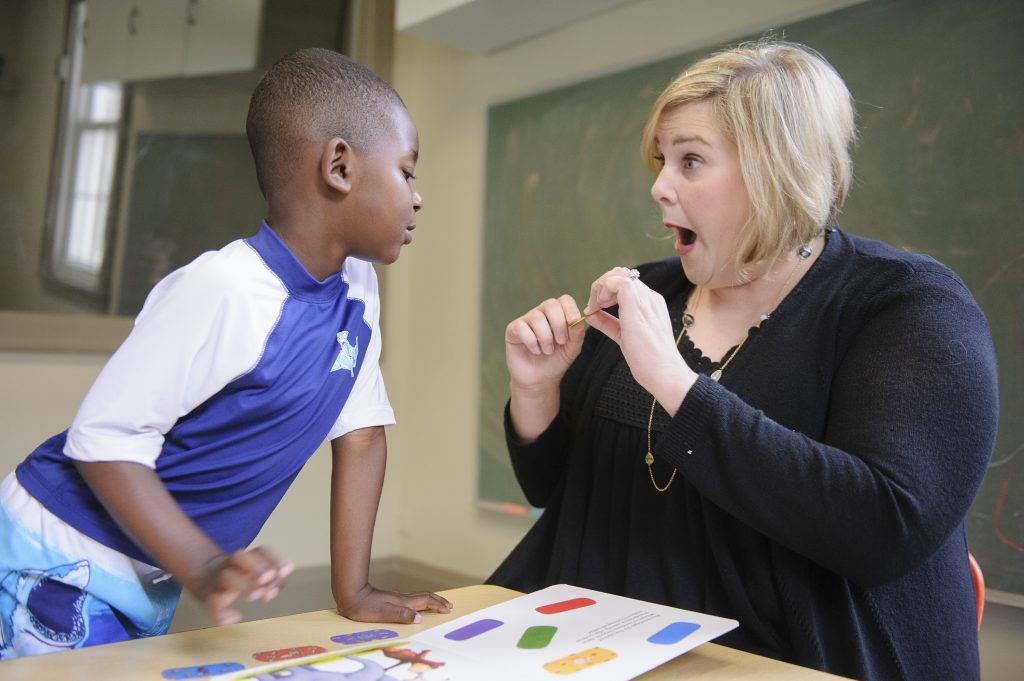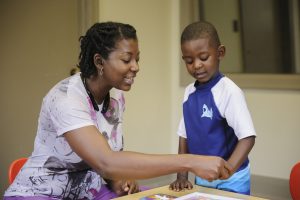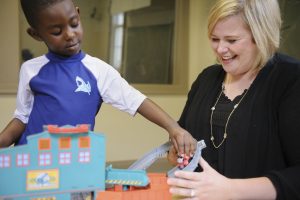
Monica Finch checked every website and read every book to prepare for a diagnosis she knew was coming.
Her son, Joey, was quiet. Though it mirrored her own disposition, withdrawn behavior at a young age can be an early sign of delayed development and autism spectrum disorder.
When Joey turned 2 years old, he started receiving developmental services and early interventions in Tuscaloosa. But when Finch met with Dr. Sarah Ryan, director of autism services at The University of Alabama, it became official: Joey has autism.
The diagnosis was “heartbreaking.”
“One of the books said ‘you have to grieve,’” Finch said. “You have all of these hopes and desires for your child, and instead of those things happening when they’re grown, that process begins now.
“I took a minute to slow down and started doing things to let him take the lead, to learn more about what he wanted to do.”
Joey is considered high-functioning, which is often defined by delays in speech and language skills, particularly within the first two to three years of development. Joey has been receiving speech and language therapy twice a week at the Child and Family Research Clinic at UA, which provides medical, psychological and speech evaluations and as many as 40 speech therapy sessions a week to children in the Tuscaloosa community.
“During the evaluation process, I evaluate receptive, expressive and pragmatic language,” said Jennifer Baggett, speech pathologist at the clinic. “If needed, we address each area in our interventions here. We also work with the families by teaching communication strategies and techniques that they can implement at home.”
Soak it all up
Baggett fits a lot into the 30-minute interventions she conducts at the clinic, where her primary goals are to increase social engagement and language skills.
Baggett also engages children in various levels of play and models appropriate ways to play with typical toys, like blocks, cars, dolls or board games, which can create a common ground in interacting with other children.

“One of my goals for all of my clients is that they will be able to make a friend and play with other children,” Baggett said. “Intervention is mostly play-based which allows the child to have fun while stimulating language development. This is a natural way to work on social skills that can easily carry over into a play setting with their peers.”
For parents like Finch, the interventions can be revealing; she’s able to see Joey grow in his speech and interaction, and she learns the techniques to use at home. A strategy as simple as using a card game to reinforce identifying “who, what, when and where” while reading stories can be translated to the home, Finch said.
“Whatever I see Jennifer do with him, I go home and do it,” Finch said. “I always make sure she explains what she’s doing – which she is great about – so I know what to focus on and what to expect. We go home and do it, and my measurement is just [Joey] talking to me, being able to understand me. Just watching him, seeing that spark, knowing he’s processing and getting it, and then him being able to respond to me.”
“We also consult with schools in our community to provide recommendations for working with students who are on the spectrum,” Baggett said.
Teamwork at the clinic
The clinic was founded more than 20 years ago and became fully operational in 2009.
The clinic currently offers evaluations and interventions for children of various ages through Ryan, Baggett and Dr. Ashley Evans, a pediatrician at University Medical Center. The team also provides training to community agencies and para-educators. Medical students also observe clinic sessions while rotating through the pediatrics department at UMC.

“We start at 16-18 months old and go across the lifespan, which makes us unique from some of the other clinics in the state,” Ryan said.
Parents begin the process by contacting the clinic, which, depending on the waitlist, should yield an initial evaluation within nine to 12 months. Ryan, Baggett and Evans perform evaluations with the assistance of student clinicians from the departments of communicative disorders and psychology. The team then meets to discuss their observations and test scores before making a diagnosis.
The typical evaluation age range is 2 to 5 years old. Children sometimes receive early interventions before getting a diagnosis at the clinic, which can be helpful in incorporating existing speech and social strategies into interventions, Baggett said.
Depending on the diagnosis, children can begin interventions at the clinic, which performs 35 to 40 speech sessions and 10 psychology counseling sessions each week.
Room to grow
Upon Baggett’s arrival in 2014, the clinic had operated for more than a year without a speech pathologist.
Ryan is trying to add another psychologist to the staff to help lower wait times for initial evaluations and increase the number of therapy sessions each week. Another psychologist on staff can shave the wait times in half, Ryan said.
“In 2012, we were averaging three evaluations over a two-week period,” Ryan said, “but now, we’re averaging that in one week. We’ve grown, but we’re continuously working to meet an increasing demand for services.”
The pool of psychologists who have a doctorate in clinical psychology, training in developmental and cognitive assessments and training in autism-specific assessments falls short of the demand, which can prolong the search for another psychologist, Ryan said. In the meantime, she’ll continue to lean on referrals to clinics that can provide the services UA cannot and continue to juggle her multiple roles at UA, including state-level advocate. Ryan is part of the Alabama Interagency Autism Coordinating Council, a state council composed of self-advocates, state agencies and providers who meet quarterly to help shape policy decisions.
“Most of our funding now comes through insurance – Medicaid, Blue Cross, etc.,” Ryan said. “We’re completely self-sustaining on those fees, but we’re hopeful to secure state-level funding in the next fiscal year that would help expand our networking ability to refer families.”
Contact
David Miller, UA Media Relations, 205/348-0825, david.c.miller@ua.edu
Source
Dr. Sarah Ryan, clinical assistant professor, UA-ACTS program director, administrative director of Autism Services, 205/348-9133, ryan029@ua.edu
